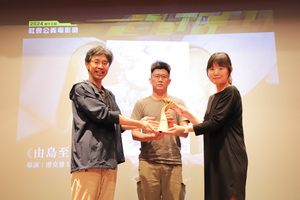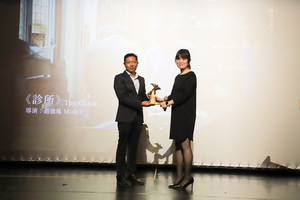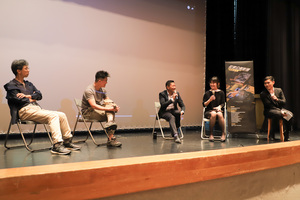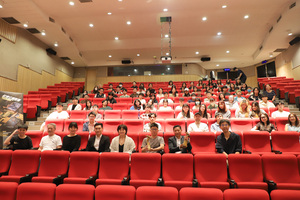Social Justice Film Awards Enter the Classroom and Celebrate Films Championing Social Issues




【Article by International College of Innovation】
The Social Justice Film Awards, an independent sidebar event of the Taipei Film Festival, celebrated its 13th year by collaborating with National Chengchi University’s International College of Innovation (ICI) course Introduction to Global Studies. The awards ceremony and post-screening discussion were held at the university’s College of Communication Theater, featuring bilingual presentations in Mandarin and English. The top honors were shared by Islands, Within (由島至島) by director Lau Kek Fuat and The Clinic (診所) by director Midi Z, both of which explore complex geopolitical and social landscapes, expanding Taiwanese audiences’ perspectives on Asia.
The event also included a thought-provoking dialogue between the filmmakers and NCCU students and faculty, delving into the creative journeys and broader societal reflections behind the winning films.
A Cross-Disciplinary Conversation: Merging Academia and Cinema
This year’s awards ceremony took a novel turn, incorporating ICI’s curriculum design and offering students an interdisciplinary learning experience. Professor Hung-Ying Chen, who teaches Introduction to Global Studies and moderated the discussion, highlighted the significance of using visual media to guide students through topics ranging from Taiwan's World War II history in Southeast Asia to contemporary societal dynamics in Myanmar.
The bilingual nature of the event allowed participants from diverse academic backgrounds—spanning ICI, the Department of History, and the College of Communication—to engage in vibrant discussions that underscored the power of film as a medium for understanding global justice and fostering cross-cultural dialogue.
Showcasing the Power of Film to Illuminate Social Justice
This year’s competition featured nine finalists, including documentaries, narrative films, short films, and animated works, covering a wide array of social issues. The two winners stood out for their nuanced storytelling and thematic depth:
- Islands, Within by Lau Kek Fuat draws on the research of historian Lan Shih-Chi to retrace the experiences of Taiwanese soldiers during World War II in Southeast Asia. Through a multi-layered narrative and mixed-media approach, the film uncovers hidden histories of national identity and war memory. Its intricate storytelling interweaves personal recollections with the broader historical trajectories of island communities, offering audiences a rich canvas for reflection.
- The Clinic by Midi Z focuses on a small community clinic in Yangon, Myanmar, using intimate portrayals of doctor-patient interactions to reveal the struggles and resilience of ordinary people amid the country’s military coup and Rohingya crisis. By capturing the quiet details of everyday life, the film sheds light on the impact of political turmoil on individual lives, prompting audiences to grapple with the stark realities of contemporary Myanmar.
Filmmaker Dialogue: Bridging History and the Present
In the post-ceremony discussion, Liao shared his inspiration for Islands, Within, emphasizing his intent to spotlight marginalized historical narratives and invite viewers to confront the discomfort of "unsettled" histories. He argued that grappling with the complexities of the past can inspire deeper reflections on present-day societal challenges.
Producer Wang Shin-Hong offered insights into he and Midi Z’s 15-year career and linked his body of work to the ongoing conflicts in Myanmar, underscoring the role of film in understanding the upheavals of postcolonial societies.
Students posed questions about how both films navigate themes of colonial oppression and authoritarian legacies while fostering a sense of cross-regional solidarity. Lau encouraged students to confront the unease of historical legacies and transform that discomfort into intellectual and creative energy.
Film as a Catalyst for Social Advocacy
The collaboration between ICI and the Social Justice Film Awards demonstrated the transformative potential of cinema in advancing cross-cultural understanding and driving social change. By merging academic inquiry with cinematic storytelling, the event not only honored the filmmakers but also underscored the expansive possibilities of interdisciplinary dialogue, amplifying the public discourse sparked by these films.
As Lau aptly noted during the discussion, “Practice to live with the discomfort brought by historical truth can be a catalyst for reexamining our relationship with society and reenvisioning our common futures.”
